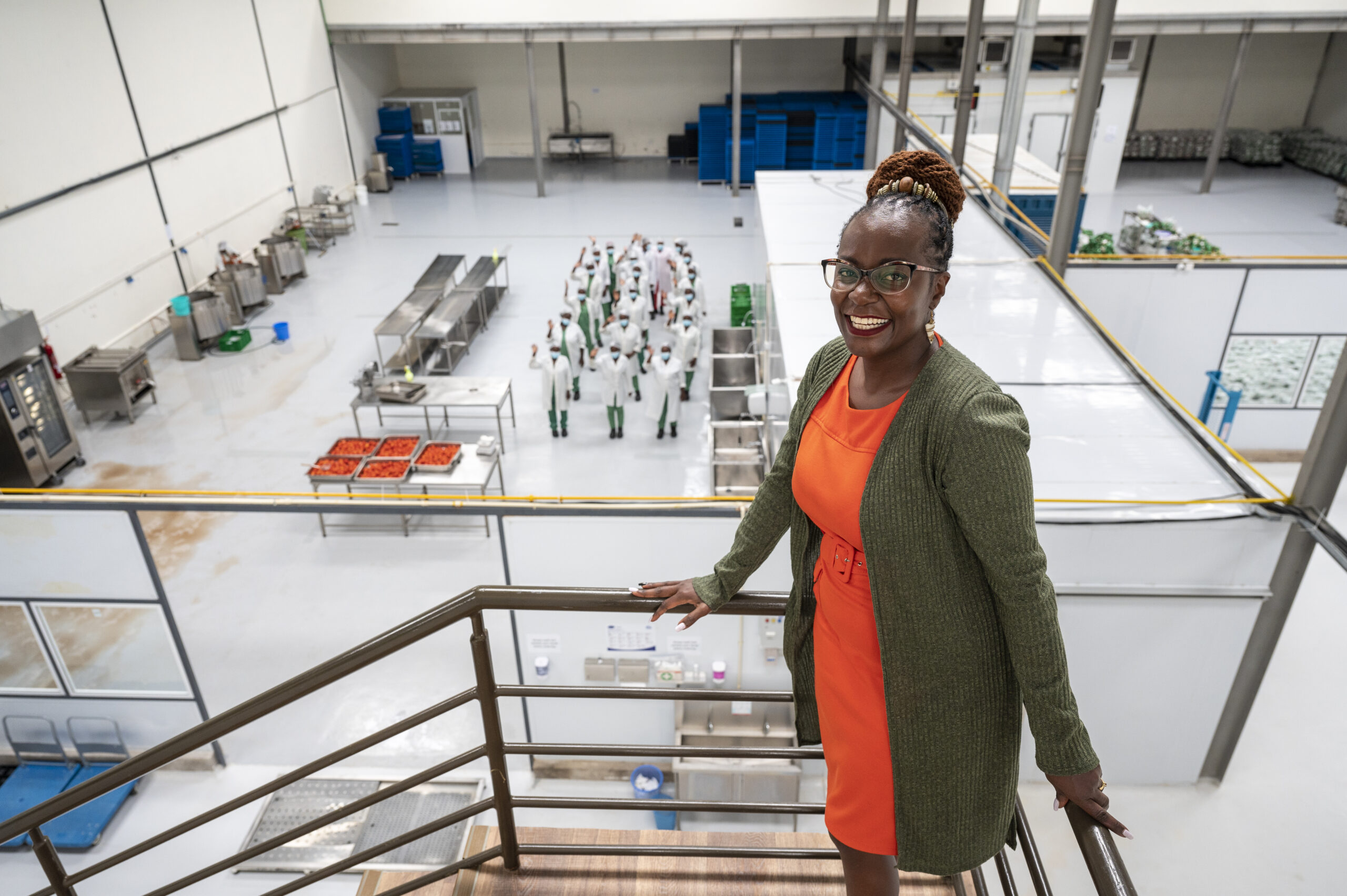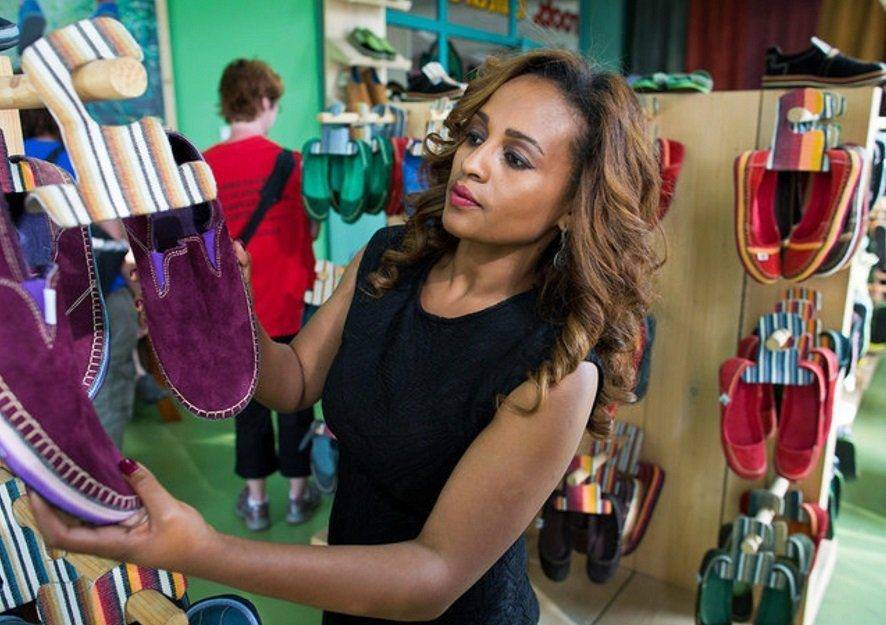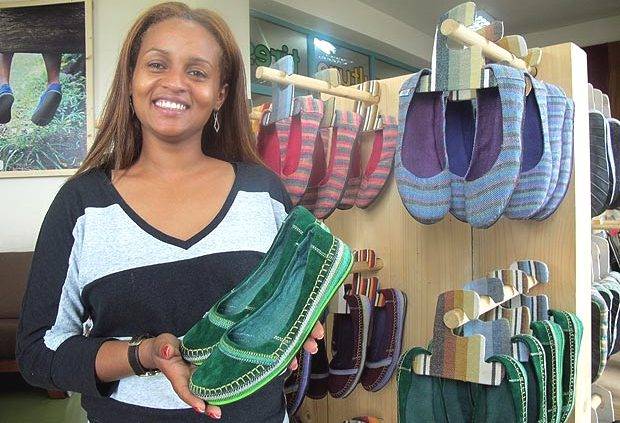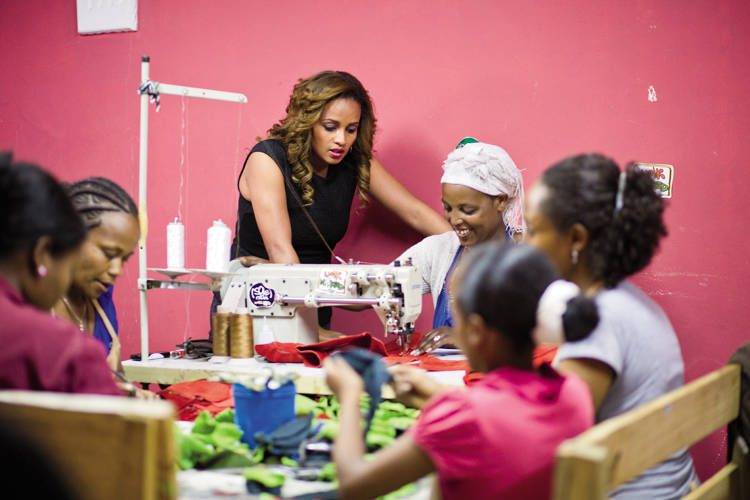She Business
Tei Mukunya: Crafting Ready-Made Nutritious Options for Urban Residents
Tei Mukunya takes a pose at the factory based in Nairobi with a smile that smacks of satisfaction for a job well done.

: Tei’s Inspirational Journey from BAT Kenya to Empowering Rural Women: A Story of Economic Vision and Social Impact
By Charles Wachira
The towering structure of Africa’s premier cargo-handling airport stands in striking proximity to the modest one-storey building housing the Nature Lock Foods factory. And the perpetual traffic congestion to and from Kenya’s Jomo Kenyatta International Airport (JKIA) appears insurmountable
But what is more sensually enthralling, viewed from the office of Anne Tei Mukunya, the 47-year Co-founder and Executive Director of this Nairobi-based ready-to-eat -food-processing company is sections of the impressionable Nairobi Expressway.
This is one of the most remarkable infrastructural achievements in Africa.
Spanning 27 kilometres, this dual carriageway boasts four lanes and toll collection stations. Without any interruption, it seamlessly connects JKIA to various parts of Nairobi.
To reach Tei’s factory, a modern structure made of brick and mortar, located within a gated half-acre land estate, one must take the Old Mombasa Road. This road is situated beneath the Expressway and is roughly three kilometres away from the airport
In Tei’s telling, Nature Locks Food factory was founded during the COVID-19 global crisis.
Together with Dutch entrepreneur Wilco Vermeer, this food processing company tackles the challenges of pre-consumer food loss and strives to transform overlooked resources into accessible, nutritious solutions for hurried urban dwellers.
It could be argued that the entrepreneurial duo observed a gap in the local market, created by a bustling population of busy commuters living in the fourth wealthiest city in Africa. These commuters needed convenient yet nutritious food options. However, despite their desire for healthy meals, Nairobi’s urban dwellers often find it difficult to obtain or afford nutritious food. Preparing nutritious food can also be time-consuming and require a lot of effort, which are both precious resources for them.
“In entrepreneurship, there are no shortcuts. You must actively seek out lessons, put in the hard work, and pave your own path to success. It’s not handed to you on a silver platter, despite what some may believe,” says Tei.
Enter Naturelock
In May 2021, the now three-year-old company launched an innovation: an instant version of mung bean stew, also known as ‘Ndengu’, in Kenya’s national language, Kiswahili, that uses a revolutionary drying technique from the Netherlands.
This method of preserving fruits, vegetables, and fish prevents spoilage while retaining their taste, aroma, colour, and micronutrients. It has received an endorsement from researchers at Wageningen UR- a university based in the Netherlands – and opens up new possibilities in the culinary world. Their gastronomy provides the convenience and affordability of IndoMie noodles, which are available in supermarkets across Africa. NatureLock’s drying technology addresses the limitations of current cold chains in sub-Saharan countries and is revolutionizing logistics.
Unlike conventional drying methods that strip flavour and nutrients, NatureLock’s process preserves the nutritional goodness of fruits and vegetables for two whole years. The magic of dehydration slashes the weight of the products by a whopping 70 per cent.
This innovation not only reduces transportation and storage costs but also significantly decreases the climate footprint. While the demand for fresh products remains undeniable, replicating Europe’s advanced cold chain infrastructure in Kenya proves challenging.
Also, NatureLock’s innovation serves as a beacon of hope, breaking the chains of long distribution routes and curbing food losses from the outset.
The Naturelock product sold under the brand name StewsDay is a dish made from 100% field-fresh vegetables, delicately dried to preserve the freshness and micronutrients that define its unique taste. It’s designed to be affordable and convenient for students, young professionals, working-class individuals, and families who are seeking quick meal solutions
But what sets it apart is its unique twist – it contains fresh vegetables that are sourced from crops that would otherwise go to waste.
This food manufacturing startup has won the highly coveted African Food Industry Excellence Award for Best New Product in Africa in 2021, marking a significant milestone for the culinary world. This incredible achievement is a testament to Tei’s commitment to revolutionising the food industry in various areas, including manufacturing, retail, academia, and food service sectors.
“At NatureLock, our mission is to combat food waste across Africa by naturally preserving fresh produce into delicious, nutritious, and accessible foods for everyone, right where it originates. Through our innovative drying process, we transform 100% field-fresh produce into wholesome, budget-friendly ready-to-eat options that seamlessly integrate into people’s daily routines. With an ambient shelf life of up to two years, our products boast a wealth of essential nutrients and retain their natural flavours,” says Tei.
Dr. David Karanja, the national coordinator of Grain Legumes at the Kenya Agricultural and Livestock Research Organization (KALRO), highlights the unique nature of these food products.
” They are pre-cooked, catering to a youthful demographic that prefers convenience over traditional methods like charcoal or firewood cooking, which can be time-consuming. Moreover, they reduce labour costs as they simply require boiling. Additionally, these products offer nutritional benefits to consumers and contribute to employment opportunities, as the company behind them employs workers”, says Dr Karanja.
KALRO stands as Kenya’s premier institution, integrating research programs spanning food crops, horticulture, industrial crops, livestock, range management, and land and water management.
Celestine Atieno Sadaka, the owner of Faces Integrated Group, the Kenyan retail company that markets products made by Naturelock, attests to the uniqueness of the product.
“It’s a unique product for there is no other precooked product in the Kenyan market for now. It has no competitor.”
Tei’s journey embodies the transformative power of innovation in directly confronting pressing societal challenges. In a remarkable collaboration, NatureLock has teamed up with Farm to Feed, a four-year-old tech-enabled solution that establishes a market for surplus and imperfect goods. This initiative aims to enhance farmers’ income, decrease greenhouse gas emissions, and enhance food security. Farm to Feed was born amidst the upheaval of the initial Corona lockdown.
“We actively source overlooked and unconventional fruits and vegetables from local farmers, and then they adeptly repurpose these culinary misfits into affordable and nutritious delights. This ingenious approach not only democratises healthy eating but also assigns a fair value to products that would otherwise languish in neglect, ” says Claire van Enk, the Dutch innovator of Farm to Feed.
Throughout the past year, Farm to Feed has meticulously been establishing a network of supply hubs for surplus vegetables, serving as a lifeline for those sidelined by conventional markets. With a keen focus on low-income consumers, this dynamic duo—Tei and Claire—is transforming food waste into a culinary feast for the budget-conscious.
NatureLock plans to increase the visibility of its products by setting up processing hubs near small farming communities in rural Kenya.
This will help to address post-harvest food loss, which is a significant problem in Kenya, with 40% of food lost annually. This amounts to a colossal Ksh 72 billion (US$535,315,982.40), more than twice the cost of building Kenya’s first major infrastructure project, the Thika superhighway.
Tei began her journey in 2010 at BAT’s Kenyan franchise. Her father’s work with rural women in Muranga then, funded by USAID, inspired her to empower others. With a background in economics and involvement in AIESEC, Tei strived to make a positive impact.
“My father played a pivotal role in shaping my business aspirations. He encouraged me to create something of real value to society, questioning my long tenure in cigarette sales. ‘Isn’t it time you offered something beneficial?’ he challenged. Since then, I’ve embraced his wisdom and never looked back,” says Tei.
She Business
Bethlehem Tilahun Alemu: From Ethiopian Artisan to Global Icon

: Discover how Bethlehem Tilahun Alemu built SoleRebels into a global,
sustainable footwear brand, overcoming challenges and transforming Ethiopian
craftsmanship.
Bethlehem Tilahun Alemu’s story begins in Zenabwork, a modest village on the outskirts
of Addis Ababa, Ethiopia. Growing up, she watched her community struggle with unemployment and poverty, despite a rich heritage of artisanal skills that remained largely untapped.

Fueled by determination and a desire to transform her surroundings, Bethlehem
embarked on a journey that would redefine African entrepreneurship and put Ethiopia
on the global map.
Her creation, SoleRebels, isn’t just a footwear brand. It’s a movement—an embodiment
of sustainability, culture, and empowerment.
A DREAM WOVEN WITH TRADITION
In 2005, Bethlehem founded SoleRebels with a simple yet powerful idea: to turn
Ethiopia’s rich artisanal craftsmanship into eco-friendly, globally competitive footwear.
Inspired by traditional “selate” shoes—made from recycled tyres—she envisioned a
brand that blended cultural authenticity with modern design.
She recruited local artisans, many of whom were unemployed, and encouraged them to
innovate while preserving traditional techniques.
Every pair of shoes was a masterpiece, crafted from hand-spun cotton, organic
materials, and repurposed car tyres. Bethlehem’s concept was groundbreaking: a product that told a story while making a global impact.
STARTING FROM SCRATCH
Like many entrepreneurs, Bethlehem’s initial challenge was capital.
With no access to bank loans or large investors, she relied on personal savings and
modest contributions from her family.
Slowly but surely, she built her business, reinvesting profits into training workers and
improving production tools. International grants and initiatives like the SEED Initiative later recognized the potential of her venture, providing additional support.

The early days weren’t easy. Artisans lacked modern tools, and accessing raw
materials was an uphill battle. But Bethlehem, known for her tenacity, tackled these challenges head-on. She developed partnerships with local suppliers to ensure a consistent supply of quality materials and invested in upskilling her workforce.
Breaking into the global market presented another hurdle. Competing against established brands seemed daunting, but Bethlehem found her edge: sustainability and ethical production.
In an era when consumers were becoming eco-conscious, SoleRebels’ ethos of fair wages, recycled materials, and cultural storytelling resonated deeply.
BUILDING A GLOBAL EMPIRE
Fast forward to today, and SoleRebels has a presence in over 30 countries, with
flagship stores in cities like San Francisco, Tokyo, and Barcelona.
It is also the first African footwear brand to be certified by the World Fair Trade
Organization (WFTO)—a testament to Bethlehem’s commitment to doing business the
right way.
Her company directly and indirectly employs over 1,200 people, making it one of
Ethiopia’s largest employers in the artisan sector.
Workers earn more than three times the industry average, a policy Bethlehem takes
immense pride in. “When we pay people well, we don’t just change lives—we transform
communities,” she says.

MENTORS AND INSPIRATIONS
Bethlehem often credits her late grandfather, a farmer and community leader, as her
greatest mentor.
His work ethic and deep belief in the power of local communities shaped her vision. She
also draws inspiration from global leaders, including Ethiopian Prime Minister Abiy
Ahmed, whose focus on innovation and economic growth aligns with her goals.
RISING ABOVE CHALLENGES
Bethlehem’s entrepreneurial journey has been marked by resilience. When production
scaled up, she faced supply chain disruptions that threatened deadlines. Her solution?
Cultivate long-term relationships with reliable local suppliers and diversify material
sources.
Entering new markets came with its own set of obstacles. Competing against
established brands requires a unique value proposition.

SoleRebels offered more than shoes—it offered a story: a product steeped in Ethiopian
culture, made sustainably, and crafted ethically.
VISION FOR THE FUTURE
Bethlehem isn’t slowing down. Her plans include:
- ● Expanding SoleRebels’ retail presence in Europe and Asia.
- ● Introducing sustainable clothing lines.
- ● Partnering with global brands to promote eco-friendly production in Africa.
Beyond SoleRebels, Bethlehem has a broader mission: to inspire a new narrative for
African entrepreneurship. She wants to show the world that Africa isn’t just a consumer
market but a hub for innovation and excellence.
CONCLUSION: WALKING THE TALK
Bethlehem Tilahun Alemu has redefined what it means to be an entrepreneur. From
Zenabwork’s dirt roads to the global stage, she has shown that success doesn’t come
from resources alone—it comes from vision, grit, and a deep connection to one’s roots.
With SoleRebels, Bethlehem has not only created a thriving business but a model for
how sustainable, ethical enterprises can transform communities. As she continues to
dream big, her footsteps pave the way for the next generation of African changemakers.
She Business
Joyce Akinyi Convicted: Heroin Smuggling Case Exposed

: Kenyan businesswoman Joyce Akinyi faces life imprisonment after being found
guilty of smuggling heroin worth US$ 34,483. Her history with crime has now
unravelled.
Joyce Teresia Akinyi’s story is one of dramatic highs and lows—rising from a successful
businesswoman to being convicted of a large-scale heroin smuggling operation.
With ties to international criminal networks, high-profile relationships, and repeated run-
ins with the law, Akinyi’s life has been marked by controversy and legal battles.
THE HIGH LIFE: BUSINESS AND INFLUENCE
Akinyi first gained prominence as the upscale Deep West Resort owner in Lang’ata,
Nairobi. Known for her affluent lifestyle, she mingled with Kenya’s elite and maintained
significant business interests.
However, behind the glamorous facade lay a darker world of alleged criminal activity.
Her personal life was equally turbulent. In 1998, she met Nigerian businessman Anthony Chinedu, and the couple had two children before formalising their union.

Their relationship was rocky, marked by numerous arrests on drug trafficking charges.
In 2013, Chinedu was deported from Kenya after authorities seized drugs in his
possession, a move that further exposed Akinyi to public scrutiny.
A HISTORY OF LEGAL TROUBLES
Over the years, Akinyi faced repeated allegations of drug trafficking. Her name became
prominent in 2008 when she was arrested in New Delhi, India, alongside former
Budalang’i MP Raphael Wanjala.
Authorities detained the pair with undeclared cash worth Sh7.59 million, suspected to
be linked to drug deals. Although released after intervention by the Kenyan government, the incident marked the start of a string of legal troubles for Akinyi.
In 2013, she and Wanjala were arrested again on the Nairobi-Namanga highway with a
suspicious white powder. Although they claimed it was corn flour, suspicions persisted,
and Akinyi’s criminal associations deepened.
THE TURNING POINT: CONVICTION FOR HERION SMUGGLING
Akinyi’s criminal activities reached a dramatic conclusion in 2019 when a police raid on
Deep West Resort uncovered 2kg of heroin worth Sh5 million hidden in a shoe rack.
The Anti-Narcotics Directorate linked the operation to an international smuggling
network coordinated by Akinyi.
The Jomo Kenyatta International Airport Tribunal found Akinyi guilty under Article
4(a) of the Narcotic Drugs and Psychotropic Substances Control Act, which
mandates life imprisonment for drug trafficking.
The court heard compelling evidence, including photographs of heroin wrapped in white
tape, voice recordings coordinating smuggling activities, and the discovery of a Tabita
Digital Scale used to weigh drugs.
Akinyi’s co-defendants, Paulin Kalala Musankinshay and Peres Adhiambo, were
similarly implicated. Evidence also revealed that Akinyi used multiple fake passports, including a Congolese passport in the names of “Mape Marline Kambura” and “Raha Eveline
Kambere,” enabling her to operate under different aliases.
FINANCIAL CRIMES AND ASSET RECOVERY
Beyond drug trafficking, Akinyi’s wealth came under scrutiny. In 2021, she lost two
luxury vehicles worth Sh20 million to the State, deemed proceeds of crime.
Investigations by the Asset Recovery Agency revealed that Akinyi deposited
suspiciously large sums ranging from Sh60,000 to Sh20 million into various bank
accounts. Her real estate investments—villas built and rented out—further indicated
illicit income sources.
THE END OF THE ROAD
On December 10, 2024, Akinyi faces sentencing, which could include life
imprisonment and a Sh5 million fine. Her fall from grace highlights the dangers of
unchecked ambition and illegal pursuits. Magistrate Njeri Thuku, who presided over the
case, dismissed Akinyi’s defence that the drugs were planted by her estranged husband
Chinedu, calling it baseless.
CONCLUSION
From her meteoric rise as a business mogul to her conviction as a drug trafficker, Joyce
Akinyi’s life is a cautionary tale of how power, wealth, and crime can intertwine.
Her story also underscores Kenya’s ongoing battle with drug trafficking and the far-reaching
consequences of organised crime. For Akinyi, the glitz and glamour of her former life
have now given way to the stark reality of justice.
Nb: Exchange rate 1 USD = 145 Ksh
She Business
How Margaret Nyamumbo Built Kahawa 1893 from the Ground Up

: Discover Margaret Nyamumbo’s journey from Kenya to the U.S. and how she
built Kahawa 1893 to empower women coffee farmers, achieving business
success and social impact
Early Life and Education: Pursuing Global Opportunities
Margaret Nyamumbo’s entrepreneurial journey began in Kenya, where she grew up on a coffee
farm. However, she moved to the U.S., a decision that significantly shaped her path.
In 2000, she travelled to Smith College, a prestigious liberal arts institution in Massachusetts,
to study economics.
Her desire to study abroad stemmed from the limited educational opportunities available for
women in Kenya at the time. As she later explained, her family encouraged her decision, viewing it as a way to give her the best opportunities for success.

After earning her degree from Smith College, Nyamumbo pursued an MBA at the Wharton
School of the University of Pennsylvania, known for its rigorous business programs.
This solidified her foundation for a future in business, although it was the allure of her roots and a passion for coffee that eventually led her back to entrepreneurship.
From Corporate Work to Entrepreneurship: Embracing Coffee Culture
After completing her studies, Nyamumbo worked in investment banking and consulting, but the world of corporate finance didn’t fully satisfy her ambitions.
It was her return to the coffee industry, deeply connected to her Kenyan heritage, that drove
her entrepreneurial leap. With a vision to support East African coffee farmers, particularly women, Nyamumbo founded Kahawa 1893 in 2018, a coffee brand dedicated to highlighting Kenya’s coffee culture while mpowering local farmers.
The name “Kahawa” is the Swahili word for coffee, while “1893” marks the year when coffee
was first commercially grown in Kenya, grounding her brand in historical significance.
Through Kahawa 1893, Nyamumbo aimed to bring a new approach to the coffee business, one
that not only celebrated East African coffee but also created fair wages for farmers.
Building a Brand with Purpose: Empowering Farmers
Nyamumbo’s vision for Kahawa 1893 went beyond just selling coffee.
She wanted to create a direct impact on the lives of the farmers growing the coffee beans.
The brand’s model incorporated a system where customers could tip the farmers directly via a
QR code found on the coffee bags.
This innovation set the company apart from competitors and positioned it as a socially
responsible business that directly benefited those involved in the production process.
In 2021, Kahawa 1893 hit a major milestone, getting its coffee stocked in Trader Joe’s—the
first Black- and woman-owned coffee brand to be featured there.
This breakthrough moment was significant for Nyamumbo, marking the recognition of her hard work and her commitment to uplifting local farmers.
Overcoming Challenges: What It Takes to Succeed
Despite the challenges of entering a highly competitive market, Nyamumbo’s determination
never wavered. In a 2022 interview with Forbes, she shared her thoughts on what it takes to be a successful entrepreneur.
“You have to be able to take the punches and keep moving,” she said. Her advice reflects the
reality of entrepreneurship: persistence, resilience, and a willingness to learn from failure are
crucial for success.
Nyamumbo also emphasised the importance of passion. “You’ve got to love what you do, or you won’t have the energy to push through the tough times,” she said.
These values have guided her journey, driving Kahawa 1893 to not only succeed but also to
change the way the coffee industry operates, particularly about fair trade and community
empowerment.
The Future of Kahawa 1893: Expanding Horizons
With her success on platforms like Shark Tank and continued global distribution, Nyamumbo’s
Kahawa 1893 is poised for growth.

Her brand continues to expand its reach, and the emphasis on ethical sourcing, community
impact, and high-quality coffee will likely remain at the heart of her business model as she looks to further innovate in the global coffee market.
Through Kahawa 1893, Nyamumbo has shown that business success is not just about
profits—it’s about purpose, people, and passion.
-

 Politics5 months ago
Politics5 months agoFred Okengo Matiang’i vs. President William Ruto: A 2027 Election Showdown
-

 Business & Money10 months ago
Business & Money10 months agoEquity Group Announces Kshs 15.1 Billion Dividend Amid Strong Performance
-

 Politics4 months ago
Politics4 months agoIchung’wah Faces Mt. Kenya Backlash Over Gachagua Impeachment Support
-

 Politics6 months ago
Politics6 months agoPresident Ruto’s Bold Cabinet Dismissal Sparks Hope for Change
-

 Politics7 months ago
Politics7 months agoPresident Ruto’s Lavish Spending Amid Kenya’s Economic Struggles Sparks Outrage
-

 Politics6 months ago
Politics6 months agoJohn Mbadi Takes Over Kenya’s Treasury: Challenges Ahead
-

 Business & Money2 months ago
Business & Money2 months agoMeet Kariuki Ngari: Standard Chartered Bank’s new CEO of Africa. What’s Next?
-

 Politics7 months ago
Politics7 months agoKenya Grapples with Investor Confidence Crisis Amid Tax Protest Fallout















